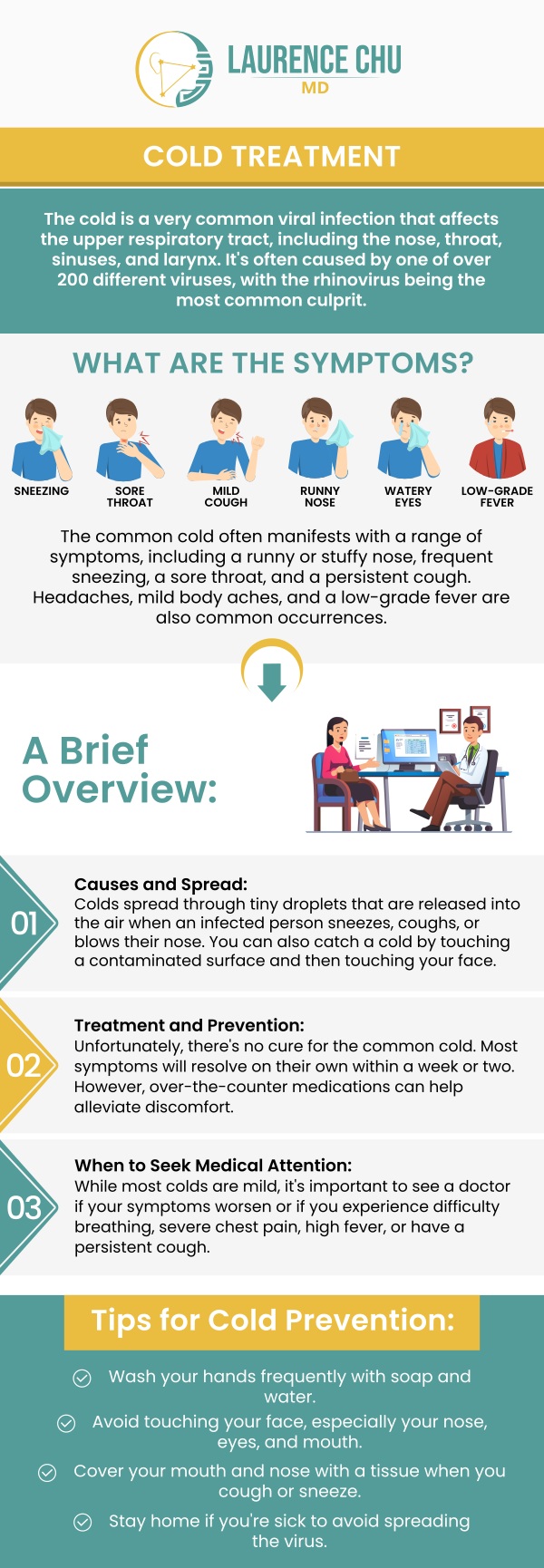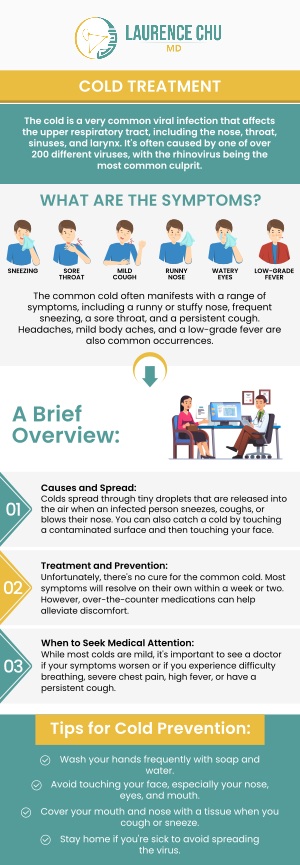Does Blowing Your Nose Make Cold Symptoms Worse?
Blowing your nose can relieve congestion, but excessive or forceful blowing may irritate nasal passages or worsen symptoms. It may also push mucus back into the sinuses, potentially leading to more discomfort. Dr. Laurence Chu, MD, FACS, offers care and guidance to help manage cold symptoms effectively, ensuring relief without complications. For more information, contact us today or schedule an appointment online. We are conveniently located at 3100 Red River St #2, Austin, TX 78705.




Table of Contents:
Can blowing your nose lead to ear congestion during a cold?
Does blowing your nose too much dry out your sinuses?
What are signs your cold is getting better?
When should I go to the doctor for a cold?
Dr. Laurence Chu, MD FACS, an experienced ENT specialist, addresses concerns about nasal and ear congestion during the common cold, explaining the connection between blowing your nose and ear discomfort.
Blowing your nose can sometimes lead to ear congestion, a common issue during a cold. This occurs due to the connection between the nose and ears through the Eustachian tubes, which help regulate ear pressure and fluid drainage. When you have a cold, inflammation, and mucus buildup can affect these tubes. Forcefully blowing your nose may push mucus into the Eustachian tubes, causing a blockage and a sensation of fullness in the ears. This can lead to temporary hearing issues, a popping sensation, and, in some cases, increase the risk of ear infections.
To minimize ear congestion, it’s important to blow your nose gently and one nostril at a time to reduce pressure on the Eustachian tubes. Using nasal decongestants, saline sprays, and humidifiers can help relieve swelling in the nasal passages and thin mucus. Limiting nose-blowing frequency also helps reduce irritation. For ear congestion relief, warm compresses, steam inhalation, continued use of decongestants, and over-the-counter ear drops may also help soothe inflammation and promote healing.
Dr. Chu emphasizes that if ear congestion persists or is accompanied by severe pain, seeking professional advice is crucial. He is equipped to diagnose and treat any underlying conditions, such as ear infections, offering relief and quality care tailored to each patient’s needs.
Blowing your nose is a common reaction to nasal congestion caused by colds, allergies, or sinus infections. While it can offer temporary relief, excessive nose blowing can lead to dryness in the nasal passages and sinuses. The sinuses are lined with a delicate mucous membrane that produces mucus to keep them moist and protect against infections. Frequent and forceful nose blowing can disrupt this protective mucus layer, leading to increased dryness, irritation, and a higher risk of minor nosebleeds. In severe cases, excessive blowing can cause inflammation, resulting in symptoms like runny nose, congestion, facial pain, and sinus infections.
Other factors, such as low humidity, especially in winter when indoor heating is used, and medications, can also contribute to drying out the sinuses. To maintain optimal sinus health, it’s important to blow your nose gently and only when necessary. Staying hydrated, using a humidifier to maintain moisture in the air, and applying saline nasal sprays or irrigators can help keep the sinuses moist. Drinking plenty of fluids can also help thin mucus and promote sinus hydration.
If you experience persistent dryness or discomfort, Dr. Chu suggests consulting a healthcare professional for personalized evaluation and advice. His expertise in sinus health can guide you in adopting effective strategies to maintain sinus well-being and prevent complications.
As a seasoned medical practitioner, Dr. Laurence Chu understands how daunting a common cold can feel. However, recognizing the signs of recovery can be reassuring.
Recognizing the signs that your cold is improving can provide reassurance during recovery. Here are some key indicators:
• Reduced Nasal Congestion: As the cold subsides, nasal congestion eases, and breathing becomes easier, with less stuffiness and a runny nose.
• Clearer Nasal Discharge: Nasal discharge often transitions from thick and colored to thinner and clearer as your immune system manages the infection.
• Diminished Cough: The frequency and severity of your cough should reduce, and it may become more productive as mucus is cleared from the respiratory tract.
• Fading Sore Throat: As inflammation subsides, the sore throat will gradually ease, signaling that healing is taking place.
• Improved Energy Levels: Fatigue and lethargy will start to decrease, allowing you to return to your normal routine with more energy.
• Waning Body Aches: Muscle and joint aches diminish as inflammation decreases, indicating progress in your recovery.
• Reduced Fever: A decrease in fever is a clear sign that your immune system is effectively combating the virus.
• Improved Appetite and Return of Taste and Smell: As symptoms improve, your appetite returns, and taste and smell begin to normalize, signaling the return of health.
Recovery times can vary, and if symptoms persist or worsen, it’s important to seek professional medical advice. Maintaining open communication with your healthcare provider ensures the best care during your recovery journey.
When dealing with a common cold, it can often be managed at home with rest, hydration, and over-the-counter medications to ease symptoms like a runny nose, cough, or mild fever. However, there are certain situations when it is important to seek medical attention from Dr. Laurence Chu, MD, FACS, to ensure no serious conditions are developing or to prevent complications.
You should consider seeing a doctor if:
• Symptoms last longer than 10 days without improvement, which may indicate a sinus infection or another condition.
• A fever remains above 100.4°F (38°C) for more than three days or exceeds 101.3°F (38.5°C) and doesn’t respond to fever-reducing medications.
• You experience a severe sore throat, difficulty swallowing, chest pain, or significant throat pain.
• Shortness of breath, wheezing, or difficulty breathing occurs, which could indicate complications like bronchitis or pneumonia.
• The nasal discharge becomes green, yellow, or blood-tinged.
• A severe headache doesn’t improve with pain relievers.
• Ear pain or drainage occurs.
• A persistent cough disrupts sleep or daily activities.
• Fatigue or weakness lasts beyond a week.
• You experience unusual symptoms, such as swollen glands.
Listening to your body is key. If you’re uncertain about your symptoms, consulting Dr. Laurence Chu is a smart choice. He can provide a thorough evaluation and guide you on the best course of action. Contact us today or book your appointment. We are conveniently located at 3100 Red River St #2, Austin, TX 78705. We serve patients from Austin TX, Del Valle TX, Allandale TX, Manor TX, Dessau TX, and surrounding areas.

Additional Services You May Need
▸ Urgent ENT
▸ General ENT
▸ Sinus
▸ Allergy
▸ Concierge ENT
▸ Septum And Turbinate Surgery
▸ Adenoidectomy
▸ Earwell Treatment
▸ Mouth Breathing Evaluation
▸ Middle Ear Surgery
▸ Tympanic Membrane Perforation

Additional Services You May Need
▸ Urgent ENT
▸ General ENT
▸ Sinus
▸ Allergy
▸ Balloon Sinuplasty
▸ Sleep Apnea
▸ Snoring Evaluation
▸ Pediatric ENT
▸ Ear Tube Placement
▸ Tonsillectomy
▸ Hearing Loss Evaluation
▸ Telemedicine
▸ Septum And Turbinate Surgery
▸ Adenoidectomy
▸ Earwell Treatment
▸ Mouth Breathing Evaluation
▸ Middle Ear Surgery
▸ Tympanic Membrane Perforation
▸ Hearing Aid Dispensing
▸ Annual Comprehensive Ent Exam
▸ Ear Cleaning
▸ Annual Audiogram
▸ Allergy Testing
▸ Travel Medication Assistance
▸ Rapid Strep Testing
▸ Rapid Flu Testing
▸ Custom Ent Travel Kit
▸ Allergy Shots And Drops
▸ Epistaxis Treatment
▸ Cough
▸ Septoplasty/Nasal Surgery




